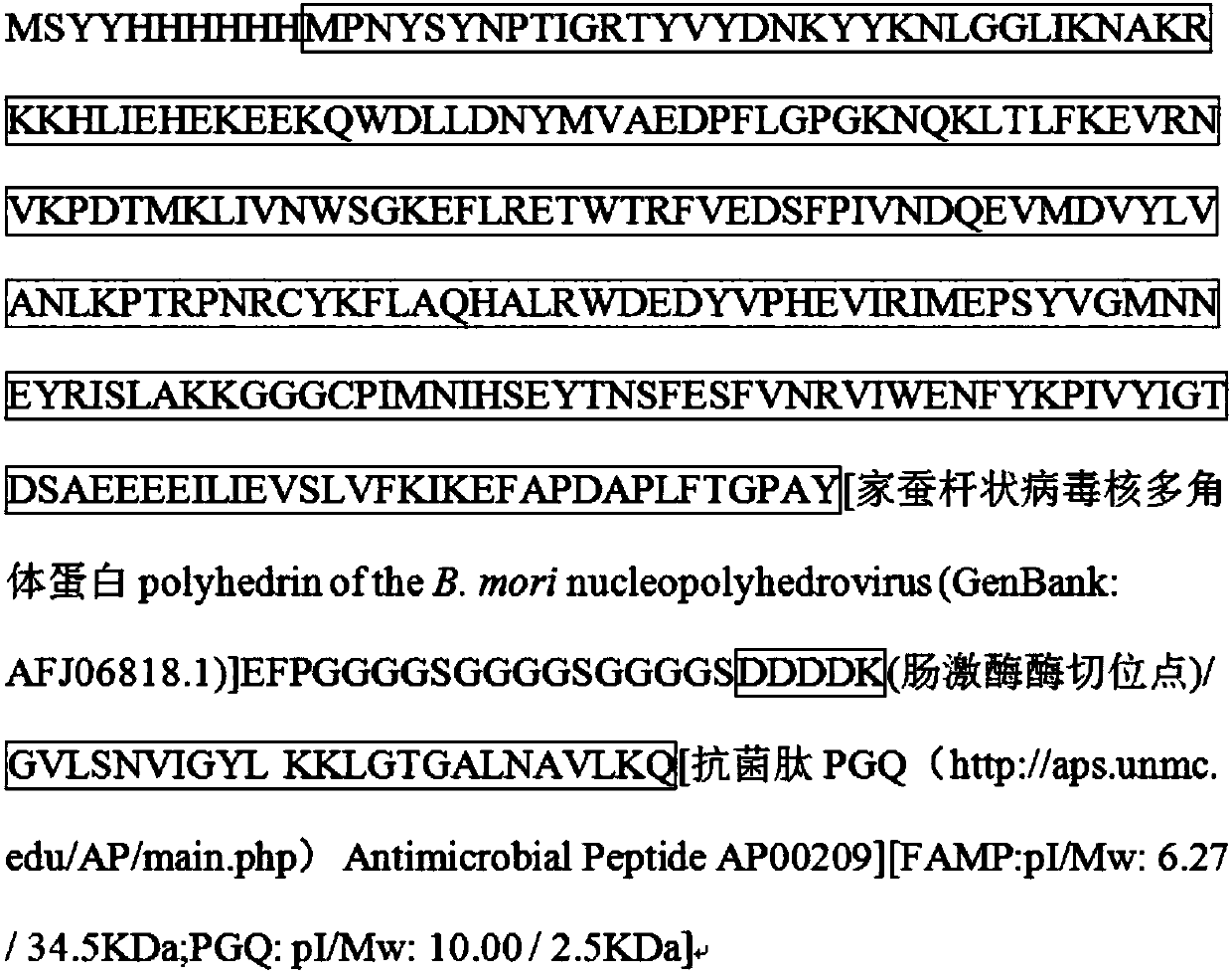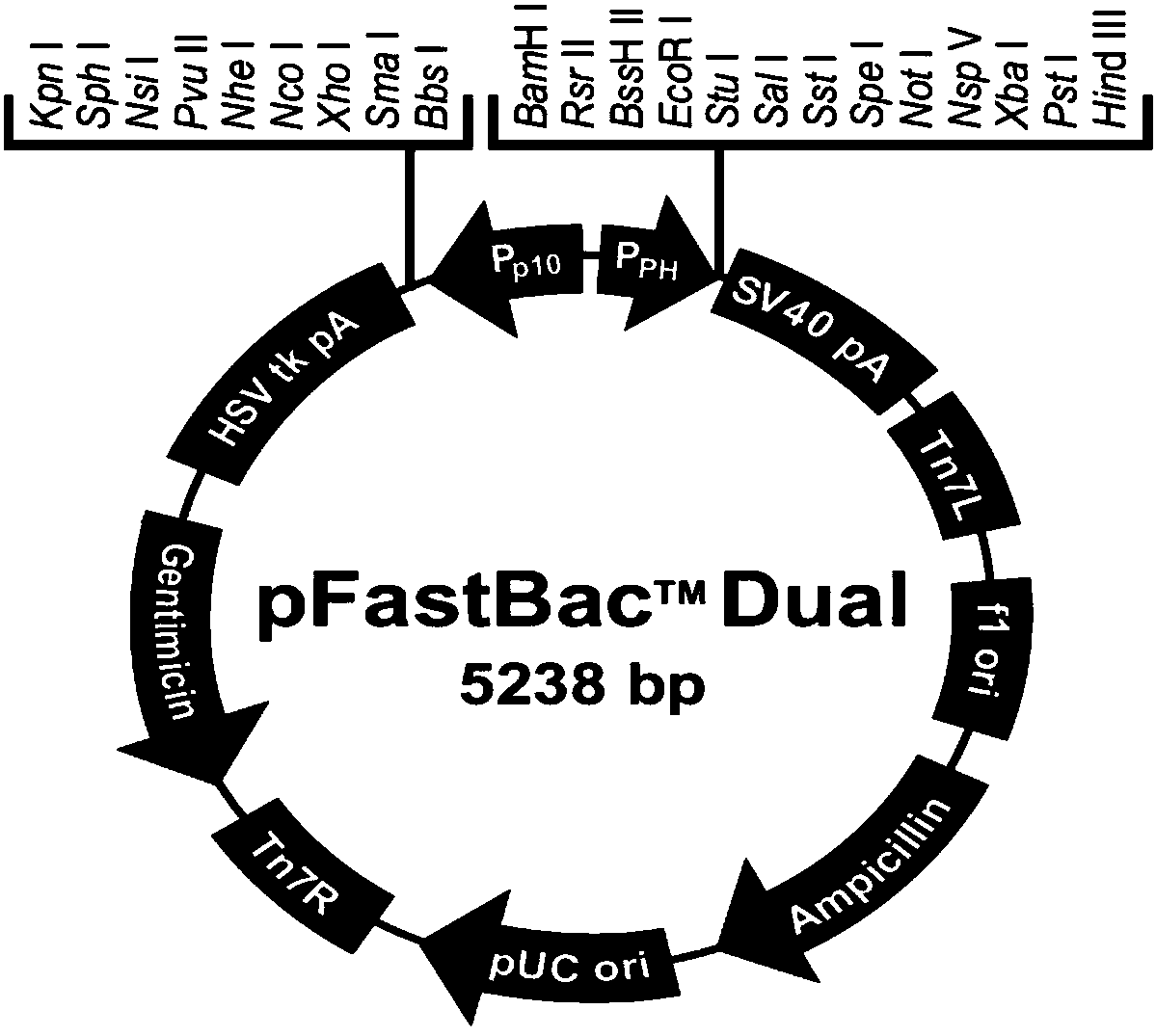Gene of encoded antibacterial peptide, gene of fusion protein and recombinant vector
A fusion protein and antimicrobial peptide technology, which is applied in the direction of virus/phage, recombinant DNA technology, and the use of vectors to introduce foreign genetic material, etc., can solve problems such as high treatment costs, poor treatment compliance, and bacterial drug resistance
- Summary
- Abstract
- Description
- Claims
- Application Information
AI Technical Summary
Problems solved by technology
Method used
Image
Examples
Embodiment 1
[0123] This embodiment provides an antibacterial peptide with anti-H. pylori activity, the amino acid sequence of which is shown in SEQ ID NO:1.
[0124] The screening and experimental process of this antimicrobial peptide are as follows:
[0125] a. Screening of antimicrobial peptides: Antimicrobial peptides have their own unique antibacterial spectrum just like antibiotics. Not all antimicrobial peptides have antibacterial activity against Helicobacter pylori. There are 25 kinds of antibacterial peptides against Gram-negative bacteria, which are synthesized by chemical methods.
[0126] b. Antimicrobial peptide preparation: According to the minimum inhibitory concentration test method, the chemically synthesized antimicrobial peptides were diluted to 64μg / mL, 32μg / mL, 16μg / mL, 8μg / mL, 4μg / mL, 2μg / mL, 1μg / mL, 0.5μg / mL.
[0127] c. Detect the minimum inhibitory concentration: add the logarithmic Helicobacter pylori ATCC34504 standard bacterial strain in each test tube to re...
Embodiment 2
[0130] The present embodiment simulates the gastric environment to carry out antibacterial effect test to the antimicrobial peptide PGQ that embodiment 1 provides:
[0131] a. Preparation of artificial gastric juice (containing pepsin and gastric acidic substances, pH 1.3-1.8);
[0132] b. Culture different strains of Helicobacter pylori, including: ATCC34504 standard strain and clinical strains isolated from gastric ulcer and gastric cancer patients.
[0133] c. Add log phase Helicobacter pylori 10 to artificial gastric juice 6 CFU / mL, then add antimicrobial peptide PGQ to achieve a concentration of 4 μg / mL (4×MIC) and no antimicrobial peptide as the control group, take 10 μL of the mixed solution at 15 min, 30 min, 60 min and 120 min to dilute to 50 μL, and apply In solid medium, count the colonies on each plate after culturing for 36 h. Calculate the sterilization rate according to the formula:
[0134] Bactericidal rate=(1-the number of colonies on the bacteria liquid p...
Embodiment 3
[0137] The antibacterial peptide PGQ provided by Example 1 with anti-H. If it is directly expressed in a large amount in the host cell, it will have a great impact on the physiological pH of the host cell, and then affect the survival of the host cell, which is not conducive to the high-level expression of the antimicrobial peptide PGQ. In fact, the inventors found in experiments that if the antimicrobial peptide is directly expressed without fusion, the antimicrobial peptide cannot be expressed in the host cell at all.
[0138] In view of this, this embodiment provides a fusion protein for expressing the antimicrobial peptide PGQ, the fusion protein has the following primary amino acid sequence structure:
[0139] Carrier protein-connecting peptide-protease action site peptide-antibacterial peptide;
[0140] Wherein, the carrier protein includes Bombyx mori baculovirus nuclear polyhedrin, glutathione sulfhydryl transferase, green fluorescent protein, or ubiquitin-like small ...
PUM
 Login to View More
Login to View More Abstract
Description
Claims
Application Information
 Login to View More
Login to View More - R&D Engineer
- R&D Manager
- IP Professional
- Industry Leading Data Capabilities
- Powerful AI technology
- Patent DNA Extraction
Browse by: Latest US Patents, China's latest patents, Technical Efficacy Thesaurus, Application Domain, Technology Topic, Popular Technical Reports.
© 2024 PatSnap. All rights reserved.Legal|Privacy policy|Modern Slavery Act Transparency Statement|Sitemap|About US| Contact US: help@patsnap.com










